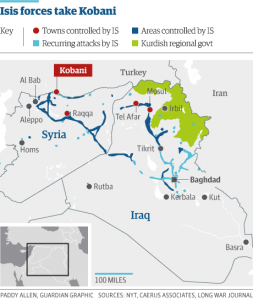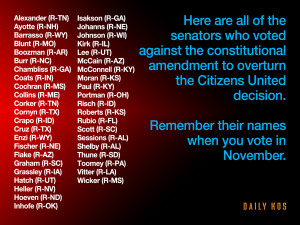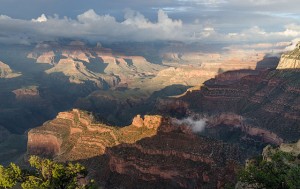On September 15, Islamic State stepped up a campaign in the Kobani region of northern Syria. Kobani is a Kurdish enclave that many refugees had fled to as threats of ISIS rose throughout the area. According to a report in “The Independent”:
“Isis fighters used tanks and artillery captured in Iraq to assault the Kurdish enclave around the city of Kobani, also called Ayn al-Arab, where between 400,000 and 500,000 members of Syria’s Kurdish minority have taken refuge. Idris Nassan, the deputy foreign representative of Kobani canton, told The Independent in a phone interview that the attack by Isis, also known as Islamic State, started on 15 September. “[It] is being made from three sides. So far they have captured 15 villages and we have evacuated another 10 because they are too close to the fighting,” he said.
Speaking from Kobani, Mr Nassan said that for the first time, the city had been hit by rockets, three of which exploded in the centre yesterday. The encircling Isis forces are between 12 and 18 miles from the city, which is surrounded by Kurdish villages held by fighters from the People’s Protection Units (YPG), the Syrian franchise of the Kurdistan Workers Party (PKK). The latter has many battle-hardened veterans experienced in fighting the Turkish army over the past 30 years.
Some 400 Kurdish hostages have been taken by Isis, including 133 school children aged between 13 and 14 who were abducted on 30 May as they returned to their homes in Kobani after taking their junior high school final exams in Aleppo.
The siege of Kobani has not attracted much publicity, far less than that of the Old City of Homs, but if it did fall then its half-million Kurds would be at risk. The pro-opposition Syrian Observatory for Human Rights is quoted as saying that there are fears of massacres in the villages seized by Isis. In addition to eliminating the Kurds as opponents, Isis wants to establish its hold on the border region with Turkey across which it can bring in supplies and foreign volunteers. Mr Nassan says the siege of the enclave is not complete since “we can still buy food at high prices from Arab brokers” but he adds that “unfortunately, the world cares nothing about what happens in Kobani”.
The YPG and PKK have proved the most effective fighters against Isis but the PKK is still labelled a “terrorist organisation” by the US and Europe. The labelling was done at the behest of Turkey, which fought the PKK from 1984, though a ceasefire was declared in 2013. Turkey has been talking to the imprisoned PKK leader Abdullah Ocalan for five years but US and European officials are still wary of contacts with the Syrian and Turkish Kurds.
Isis has captured most of eastern Syria, defeating both the Syrian army and rebel movements during the summer. Isis fighters are within 30 miles of Aleppo, the largest city in Syria, and have been consolidating their positions elsewhere. They have been moving their headquarters and heavy weapons out of easily identifiable locations in preparation for US air attacks.”
Occupy World Writes calls on the coalition forces to assist the Kurds in defense of Kobani. These people are from the same ethnic group that brought the world’s attention to the plight of the Yazidi when ISIS chased them into the Sinjar mountains. The international community responded overwhelmingly to save the Yazidi from certain massacre. Now the Kurds are facing that very same fate. We also have no reason to believe the Islamic State would show no mercy toward the inhabitants and refugees in Kobani, since Kurds are the only ground force able to offer a defense against ISIS.
We can not sit in complicity while children, women and men are slaughtered at the hands of a terrorist organization. This is not humane, this is not sane, this is not in accordance with the words of Allah, God, or any divine entity.




![TransCanada Building, Calgary. Photo by Qyd (talk · contribs) (Own work (Own photo)) [GFDL (http://www.gnu.org/copyleft/fdl.html), CC-BY-SA-3.0 (http://creativecommons.org/licenses/by-sa/3.0/) or CC-BY-2.5 (http://creativecommons.org/licenses/by/2.5)], via Wikimedia Commons](http://occupyworldwrites.org/wp-content/uploads/2014/09/Trans_Canada-logo-224x300.jpg)





